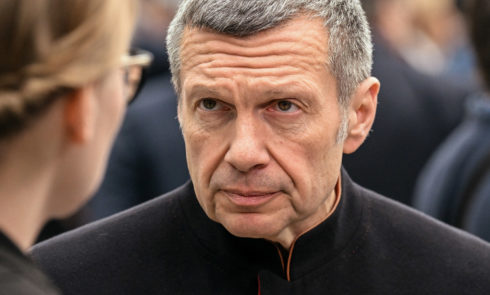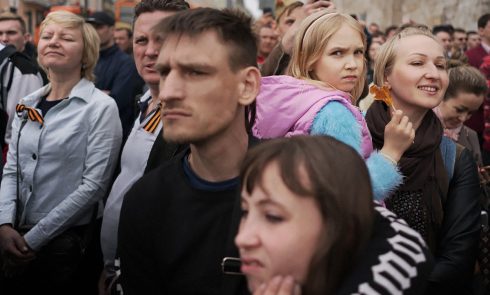Censorship hasn’t prevented Russians from debating the war in Ukraine all throughout 2022—not only among family members, but also between complete strangers in random group chats for neighbors in the same apartment building or for school kids’ parents. After such altercations, some people are forced to leave such chats, while some get reported to the school boards. Holod tells the stories of the people who participated in some of these heated debates.
Names have been changed at the request of the interviewees.
“Rinse that western propaganda out of your brain”
On February, 2, 2023, Lyubov Lapshina, a 47-year old Krasnodar resident, received a text message which read: “Let’s do without your treacherous slogans like ‘Peace on Earth’. I'm beginning to think that you’re violating article 207.3 (legislation banning the spreading of the so-called ‘fake news’ regarding the Russian military—ed. Holod).” This conversation took place in the group chat for the parents of her daughter’s classmates. The threatening message was sent by Oksana Dementieva: both she and Lyubov are part of the parents’ committee and their daughters, Ksyusha Lapshina and Vika Dementieva, used to sit next to each other at school. Lapshina remembers their relationship as being almost friendly; they would drink tea together and organize picnics for the children in the grade.
Dementieva wrote the message in response to Lapshina’s disagreement with her suggestion: Dementieva had thought it was a great idea to give the boys in the class military-themed socks as presents for the 23rd of February (Defender of the Fatherland Day, which over the years has turned into a holiday celebrating boys and men—ed. Holod). “We [in the parents’ committee] decided to let the girls in the class choose what the boys’ gifts should be. They’re in the 8th grade—they have their own opinion! However, Oksana made her own decision to go to the mall with the homeroom teacher and buy khaki socks with camouflage packaging”—Lapshina explains—“I let them know that I disapproved of war-themed presents. War is all around already, so let the children have a normal childhood.”
Lapshina had never even sent any messages containing the words ‘Peace on Earth’ in the chat. She just has a picture with these words as her WhatsApp status. According to Lapshina, she purposefully avoided the topic of the war in the parents’ chat. Only once, in December 2022, she expressed her disapproval of the war personally toone of the mothers when she asked her if she wanted to donate money for the Russian soldiers in Ukraine.
After Dementieva hinted at the ‘Fake News’ law, she addressed Lapshina again: “You’re a grown woman! Lyubochka (diminutive of Lyubov — condescending in this case—ed. Holod), read some books! Stop using Instagram and YouTube [as sources information]! <...> Rinse that western propaganda out of your brain. So ungrateful while our boys are fighting to defend you and your family.”
Dementieva did not stop there and demanded Lapshina leave the parents’ committee via voice messages in the chat. She also informed Lapshina that she was going to report to the homeroom teacher and the principal that her daughter does not attend the class called “Conversations about Important Things” (propaganda classes designed to convince children of the righteousness of the war in Ukraine—ed. Holod), and skips the raising of the flag ceremonies. “You’re turning your daughter into a Russia-hating monster,” Dementieva wrote.
Ksyusha Lapshina was in fact skipping “Conversions about Important Things”, as well as Life Safety lessons, where their teacher would recite Russian state television broadcasts. She also demonstratively wore a peace sign lapel pin on her clothes, and so did some of her classmates. Her mom says that the homeroom teacher pretended not to notice Ksyusha’s absences and would only sometimessay: ‘Someone overslept again’ as a joke. However, on February 6, Ksyusha was called to the deputy principal’s office and asked to begin attending the lessons she would normally skip.
Lapshina does not have any evidence to prove it, but suspects that her daughter was called to the deputy principal’s office after Dementieva’s tip. A few days later, the homeroom teacher decided that Ksysha and Vika ought to sit at different desks.However, the girls remained close.
“Don’t you dare threaten us Russians!”
This episode disheartened Lapshina, who has had good relations with the other mothers and has actively participated in various discussions ever since their children started school.
There are eight mothers in the parents’ committee group chat. Three of them took Dementieva’s side; one of them took Lapshina’s suggestion to revisit this conversation several years from now very close to the heart: “Is that a threat? Lyuba, please, don’t use this chat for your propaganda. You can stick to your opinion, but don’t you dare threaten us Russians!” The rest of the mothers either ignored the exchange or texted Lapshina privately to express their support.
“I did not expect that my message about the socks would evoke such a reaction, " Lapshina says. “I naturally responded to Oksana, but I did so as carefully as possible to try and deescalate the situation. We have a woman in the chat whose husband is currently fighting on the Russian side in Ukraine, and I knew that it was difficult for her, and I did not want to upset or judge her.”
At one point Lapshina texted Dementieva privately. “Can you explain what all of this is for? If it started for the sake of the Donbass, why did they try taking Kiev then? And why did they not conquer it in three days as they promised? And why do you think the entire civilized world has turned away from us, and our only friends now are North Korea, Iran, and some underdeveloped African countries?” Lapshina inquired. She did not expect an answer as she texted Dementieva just to try and get her to doubt her convictions.
However, the next day Lapshina received 18 pages worth of a response to her questions.
These are some of its key points:
- The West wants to dismember Russia. However, it is bound to fail because the USA has no future, as it is a country built on lies and hatred, which is only capable of creating coalitions of puppet states around itself.
- Russia has many friends, the main of which are the navy and the army (Dementieva was clearly citing emperor Alexander III’s quote “Russia has only two allies – its Army and its Navy.”).
- Russians must trust Putin and pray for him instead of spreading gossip. Russia is not fighting Ukraine, as Ukraine is not a sovereign country and does not have its own government; it is ruled by the Washington Obkom.
- Russia is fighting the USA and NATO on “historically Russian land.”
- The war broke out because NATO’s 51 countries viscously encircled Russia (Dementieva recorded this point in a separate voice message. As of March, 2023, NATO only includes 30 countries.)
“Good luck! I hope you come to your senses, Lyuba! You will be ashamed of yourself when Russia wins and becomes just, mighty and big again. You’ll see that many countries will join us, even those that serve satan nowadays,” Dementieva wrote. She concluded her address with Sergei Kagarshin’s poem “I am Russian! Thank you, God!”
I am Russian! Thank you, God!
I am the field. Grandmother’s cross.
I am the huts in the Ryazan region.
I am the blue. The support of the forest.
I am Russian! To the bone.
Eternally. In and out.
I am a swan’s feather.
I am the bone of a fallen soldier.
No matter the hardships
I wheeze to all of evil:
I am Russian! Thank you, God!
I am Russian. How lucky am I!..
Let the time go by,
You can’t take me from myself.
Russia, like a fortress atop the abyss,
Stood and will stand yet!
“I don’t argue with morons”
The arguments surrounding the war are not limited to school parents’ group chats. Tatiana Sharipova, 50, from Korolev (a town outside of Moscow—ed. Holod) was forced to leave her apartment complex group chat, in which the residents discussed household issues. According to Sharipova, since the war broke out, some people began openly “Sieg Heiling” (suppotring the war: not using the Nazi salute in this case, rather the Z symbol associated with the Russian occupational forces—ed. Holod) and one member was trying to get the rest of the chat to donate money for “underwear, equipment and trench candles” for the Russian soldiers. “He donated his own money, sent the receipts and videos of grateful soldiers in the chat,” Sharipova tells Holod. Her neighbors participated in these campaigns quietly and never talked about it.
When last fall the neighbor announced a new fundraiser, Sharipova could no longer hold herself back. “I suggested they create a new group chat for these fundraisers, and drew a comparison between the amounts of money the government was spending on the military and how much was allocated towards education and healthcare. I finished by saying that a lot of soldiers are mercenaries, so they can take care of themselves,” she recounts.
Sharipova said that some members of the chat (soldiers and those who actively participated in the fundraisers) had a strong reaction to her message. The neighbor who organized fundraisers got belligerent and questioned her if she was against the war and helping the soldiers. “But I don’t argue with morons”—Tatiana said—”I responded that they shouldn’t be trying to use the "Discreditation”(legislation against ‘discrediting’ the Russian military—ed. Holod) law against me, since they were the ones doing the discrediting it with their charity. After that I left the group chat.”
Sharipova is not bothered by being out of the loop regarding the news of her apartment complex. It is more important for her to know that she “has nothing to do with this madhouse.”
A similar story happened to a Mytischi (Moscow suburb—ed. Holod) resident, 31-year old Ivan Astakhov. During the first months of the invasion, he hung posters condemning the war in his apartment building’s hallway; they would read: “On February 24, Putin and his army attacked Ukraine, he must be stopped.” At the same time, his neighbors sent photos of children standing in a Z formation, as well as excerpts from Oleg Gazmanov’s (pro-war and pro-Putin singer—ed. Holod) track “Onward, Russia!” to the residents’ group chat. According to Astakhov, “informal conversations were welcomed” there.
“[Having seen these images] I could not keep silent,”—Astakhov said,—“and suggested we also start sending photos of the people who died at the hands of our soldiers in Ukraine. I wanted to let them know that not everyone supports the war and that they won’t get away with sharing these atrocious displays and merrily clapping their hands.” A few minutes after that message was sent, the admin of the group chat removed Astakhov from it, however, he was able to glance at one response, which asked him why he was so certain that these photos of dead bodies were not photoshopped. Astakhov’s spouse remained in the group chat and told him that after his removal a big fight broke out: some neighbors spoke in favor of the war, whereas others condemned it. Quite a few people wound upleaving the group chat voluntarily.
“I asked the admin why he let the sieg-heiling people speak but banned those that spoke against it”—Ivan tells Holod—”the response was: ‘Keep those conversations to your own kitchen’ — that’s where the conversation ended.” At this point, Astakhov gets the latest updates regarding their apartment building from a much smaller group chat, which used to be only for discussing the property management company and trash piles outside of the building.
However, a few months after the war began, this topic was brought up in the other chat as well. Last September, the same neighbor that would send Gazmanov’s songs in the other group chat suggested doing a fundraiser for the residents who were conscripted under the “partial” mobilization. Soon she left the smaller group chat as no one expressed any desire to participate.
25-year old muscovite, Eva Cherkudinova, recalls that by New Year’s Eve one of the residents of her apartment building had messaged in their group chat asking everyone to not throw tin cans out. “I just heard that our boys [on the frontlines] are sitting there without any lighting. We’ve got lots of wax, but not enough cans to make candles for them. When cooking for New Year’s, please don’t throw out the cans, I will come by in early January and pick them up from you,” she wrote and attached a video of her relatives crafting these candles.
Some residents responded saying that soldiers could not possibly have a shortage of tin cans as most of their food there is canned, so they figured that so many cans could fall into Ukrainian hands, which they can use to make “mini-bombs.”
“I responded that these insinuations were ridiculous and asked why we were discussing the needs of the ‘great’ army in our apartment building group chat,” Cherkudinova recounted, “in response, they told me to stop living in Russia. They said that my message sounded like mocking and that many of them were offended.”
Some of the neighbors suggested sending screenshots of this exchange to “you know who” to silence the criticism. At this point Cherkudinova made a joke that instead of getting the boom gate that the group chat was created for they were now getting denunciations. “The conversation led to the admin posting a poll asking whether it was acceptable to use this chat for unrelated topics but he deleted all their remarks before announcing the results of the poll”, Cherkudinova said. Since then, no such conversations arose in the group chat.”
In February,2023, the human rights organization, OVD-Info put together the number of people prosecuted in criminal cases regarding the ‘Fake News’ law at 139. The number of people prosecuted for the ‘Discreditation of the Russian military’ is 49. According to the Attorney General’s Office, the total number of violations of the ‘Fake News’ law in 2022 was 180. ‘Discreditation’ cases considered misdemeanors were counted to be around five thousand by Mediazona. Quite a few subjects were held liable for their anti-war posts on social media, some of which were posted in public group chats.
“Expressing one’s opinion in a group chat nowadays is almost equal to picketing”
Daria Korolenko, lawyer and analyst at OVD-Info, says that it would be difficult to gauge the risk of being held legally liable for expressing anti-war opinions in such group chats. “But we know that out of the 2032 ‘discreditation’ cases that had to do with social media, 395 had to do with Telegram, 114 with Whatsapp, and 116 with Viber. In other words, most of these persecutions are conducted against people who expressed their position in various chats,” Korolenko says. Most often people face persecution for messages sent to large groups of people, which undercover authorities could infiltrate more easily. However, human rights advocates often come across court cases based on messages in school parents’ and apartment building group chats.
For instance, last May,Matveyev (first name not provided), a Tula resident, was found guilty of a misdemeanor for calling the Z and V symbols “shameful” in a school parents’ group chat. Another case was tried at the Krasnogorsk (Moscow suburb—ed. Holod) Town Court. Kuznetsov (first name also not given) left a chat comment about a blood drive, evidently organized for the benefit of the Russian soldiers in Ukraine; this comment was considered to be humiliating to the Russian soldiers and in violation of the ‘discreditation’ law.
“According to our research, the number of denunciations rose since the beginning of the war, because more new laws were implemented and people know about it,”Korolenko says. “People now know that they can report on those who criticize the government so they alert the police more often. Moreover, the government itself is doing everything in its power to divide the nation into those who support the war and those who don’t. They do that in order to get them to fight each other, which causes the surge in denunciations.”
It’s worth noting that similar conflicts in various group chats used to arise well before the war broke out. The only difference is that since the invasion, people’s disagreements have become much more heated. Tatiana Orlova, a psychologist, claims that often conflicts appear out of nowhere because the current state of affairs has a very strong effect on a lot of people and serves to divide them.
“Before the war, most people had almost identical views of the country we lived in, of what we did and didn’t like. There were people with differing opinions but the same basic understandings,” Orlova explains, “but this reality shattered when the war began, for it concerned all of us in one way or another, so people had to search for answers. Most subscribed to the socially acceptable view that the state propaganda sold them. People who thought otherwise are now on the opposing side. This division is becoming more and more apparent as the days go by; it is especially evident in group chats.”
Orlova says that people who want to help others shed the veil of propaganda need to engage with them but err on the side of caution. “Firstly, one must gauge the risk involved. It’s important to realize that expressing one’s opinion in a group chat nowadays is almost akin to picketing,” Orlova claims.“Regardless, I would still encourage trying to have these conversations, but beware of the consequences. I would suggest not viewing people with an opposite view of the war as irredeemable idiots. Treat them with respect, provide argumentation that they are more likely to agree with and don’t let the conversation get heated.”



